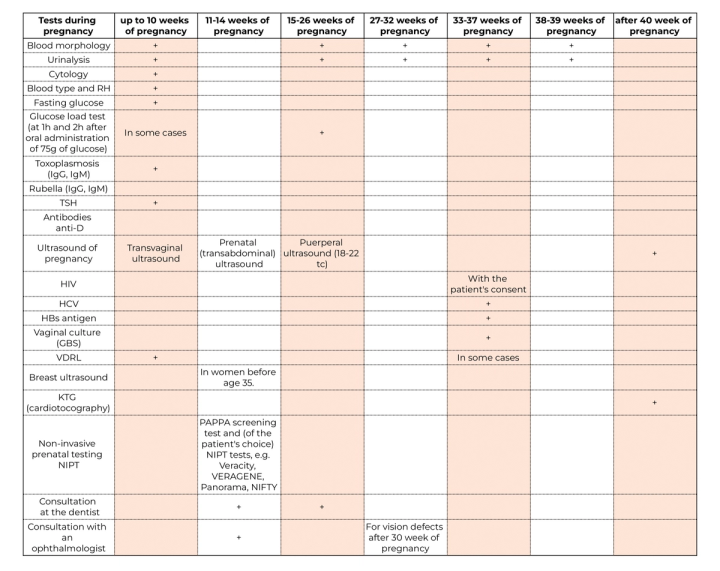Pregnancy Examination Calendar - What Tests to Perform?
During pregnancy, numerous tests are conducted, but not all at the same time. The timing of these tests depends on the specific knowledge desired and their type. Some tests cannot be performed too early or too late as the results may not be reliable. Learn about the tests that should be conducted at different stages of pregnancy.
The beginning of pregnancy is overwhelming with information and often advice from those around you. Doubts may also creep in about whether you can handle the new situation. How to calm this chaos of thoughts? Firstly, trust your prenatal care provider, who will guide you through each stage of pregnancy and important tests. Secondly, lean on the support of your loved ones and don't hesitate to ask for help, as your well-being affects your little one too.
Tests in the First 10 Weeks of Pregnancy
A significant experience will be the transvaginal ultrasound (subsequent ultrasounds will be conducted through abdominal layers). It is during this time that you will see the life growing inside you on the monitor for the first time. Your gynecologist will recommend a complete blood count, general urine tests, fasting glucose levels, and blood type and Rh factor tests (if you have already had this test in previous years and it's recorded in your health records, you might not need to repeat it).
Prenatal Tests
From the 10th week of pregnancy, you can undergo non-invasive genetic tests such as VERAGENE or VERACITY, using blood samples (for VERAGENE, a saliva sample from the father is also required). With just this, you can assess the risk of genetic disorders with 99% accuracy at such an early stage of pregnancy, including trisomies (such as Down syndrome), sex chromosome disorders (such as Turner syndrome or Jacobs syndrome), and microdeletions (such as Di George syndrome). VERAGENE also detects monogenic diseases like cystic fibrosis and phenylketonuria.
There are also advanced prenatal tests available such as Nifty Pro, which assesses the risk of 84 microdeletions, including Angelman syndrome and Prader-Willi syndrome. Panorama test, like Nifty Pro, detects cat cry syndrome, characterized by a baby's cry resembling a cat's meow (hence its name) and is responsible for the child's abnormal intellectual and motor development.
The choice of next-generation prenatal tests is extensive. It's essential to know that not all genetic diseases are hereditary, including cat cry syndrome mentioned earlier. Sometimes, it's a result of spontaneous mutations occurring during conception. Doctors call this population risk because it applies to every pregnancy. Non-invasive genetic tests are especially recommended for women over 35, those who have experienced miscarriages, or have a family history of congenital disorders (applies to both mother and father). These tests are safe for the baby but are not mandatory, so the decision to undergo them is up to you.
Tests in Weeks 11-14 of Pregnancy
Blood pressure and weight measurement are taken at every prenatal visit. You will be referred for a comprehensive screening test, including the Pappa test to determine Pappa protein and beta hCG. These tests, combined with prenatal ultrasound, aim to detect fetal development abnormalities and assess placental function. At this stage, you might also be asked to fill out a questionnaire evaluating the risk of depression. Pregnancy involves immense emotions. Additionally, consider consulting an eye specialist and dentist.
Tests in Weeks 15-26 of Pregnancy
It's time for the mid-pregnancy ultrasound between the 18th and 22nd weeks when you will hear your baby's heartbeat. Mandatory tests also include general urine tests, complete blood count, glucose tolerance test (1-hour and 2-hour after oral administration of 75g of glucose dissolved in water), anti-D antibodies for Rh-negative women, and toxoplasmosis antibodies.
Tests in Weeks 27-32 of Pregnancy
From the 28th week, you enter the third trimester, so it's time to repeat the complete blood count and general urine tests, undergo the third-trimester ultrasound, and check anti-D antibodies and immunoglobulin (if there are indications related to the so-called serological conflict).
Tests in Weeks 33-37 of Pregnancy
In the third trimester, fetal movements and heart function are assessed. Breast examination is performed, and again, complete blood count and general urine tests are conducted. At this stage, expect tests for HBs antigen, anti-HIV and GBS antibodies (cultures for group B hemolytic streptococci). The doctor will also order VDRL (syphilis screening) and anti-HCV antibodies.
Tests in Weeks 38-39 of Pregnancy
As the due date approaches, it's time for obstetric examination, evaluating fetal movements and heart function. Again, you will be directed for a complete blood count and general urine tests. After the 40th week of pregnancy, in addition to obstetric examination and assessment of fetal movements, ultrasound and cardiotocography (CTG) are performed to assess whether your baby's heart is functioning correctly, as well as uterine contractions.
